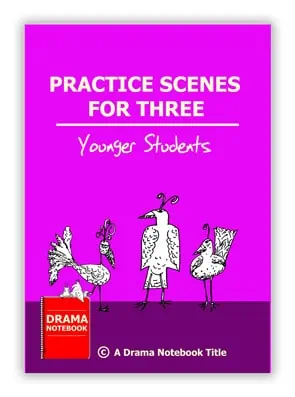



Young actors often focus on line delivery rather than listening to their scene partners. These original short scripts are designed to help younger students learn to focus on their fellow actors and practice using natural-sounding dialogue. The scenes are self-contained (no play analysis needed), and there is plenty of room for interpretation and individual character development.
A. Are you going to Sam’s birthday party this weekend?
B. I wasn’t invited.
A. Oh, I’m sorry. I thought you were.
B. It’s okay. I don’t know Sam very well anyway.
A. Well, I need to think of a good birthday present. Do you have any ideas?
B. What does Sam like?
B. How about a zither or a trombone?
A. I don’t know what a zither is, and I’m pretty sure Sam doesn’t play the trombone.
C. What else does Sam like?
C How about a Komodo Dragon or a goose?
A. No offense, but I don’t think either of those would make good pets.
B. There must be something else that Sam likes.
B. I’ve got the perfect idea. A sailboat.
A. Not those sports.
B. Listen, we were just trying to help.
A. Thanks, but I think I’ll choose the gift myself.




Member of. 


Inside Drama Notebook, you will find a huge collection of well-organized lesson plans, scripts for kids, drama activities, 50 drama games on video and more! Join today and dramatically reduce your planning time while delivering fresh, innovative drama lessons to your students! If you are new to teaching drama, this site will be a Godsend! You will immediately feel confident about teaching drama like an expert. The site guides you step-by-step and provides you with materials that you can use right away with your students.
If you have been teaching for years, Drama Notebook will inspire you with a fresh new approach and innovative ideas!
The site is packed with original, innovative lessons and activities that you will not find anywhere else—and new materials are added monthly.